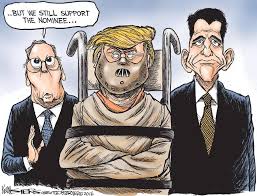—Psychopaths or Narcissists?
 On November 8th of this year, the “unthinkable” happened. Donald Trump was elected president. Although his campaign sounded more populist that free-market fundamentalist, his choices for cabinet tell a different story. Liberals and progressives and just plain poor people are deeply concerned about the future. Alternet has an article whose title spells it out: It’s Ayn Rand’s America Now: Republicans Have Stripped the Country of Its Last Shred of Morality. Now Trump is hardly the ideal of Objectivists or Libertarians. He doesn’t embrace freedom for the individual, not with his “pro life” and anti-immigrant stance; certainly not with his intention to punish anyone who burns the flag. But the Republican Party representing the 1%, may well make the country Ayn Rand’s America.
On November 8th of this year, the “unthinkable” happened. Donald Trump was elected president. Although his campaign sounded more populist that free-market fundamentalist, his choices for cabinet tell a different story. Liberals and progressives and just plain poor people are deeply concerned about the future. Alternet has an article whose title spells it out: It’s Ayn Rand’s America Now: Republicans Have Stripped the Country of Its Last Shred of Morality. Now Trump is hardly the ideal of Objectivists or Libertarians. He doesn’t embrace freedom for the individual, not with his “pro life” and anti-immigrant stance; certainly not with his intention to punish anyone who burns the flag. But the Republican Party representing the 1%, may well make the country Ayn Rand’s America.
 Many enemies of Ayn Rand’s philosophy (and there are many) like to call her a “psychopath.” Of course, many of these same people call anyone they disapprove of a “psychopath.” Is she one? Is her philosophy an expression of psychopathy, par excellence?
Many enemies of Ayn Rand’s philosophy (and there are many) like to call her a “psychopath.” Of course, many of these same people call anyone they disapprove of a “psychopath.” Is she one? Is her philosophy an expression of psychopathy, par excellence?
A friend of mine who, like me, is a socialist and also a psychopath has admitted that, were he wealthy, he would probably change his politics. I admitted I probably would too. We psychopaths are on our own side first and foremost. In that respect, we think in a way that is similar to the way Ayn Rand thought. But there is a difference. We are amoral and Ayn Rand was very moralistic indeed. We consider altruism optional. If we want to be altruistic, that’s our business. She considered altruism evil. “Altruism does not mean mere kindness or generosity, but the sacrifice of the best among men to the worst, the sacrifice of virtues to flaws, of ability to  incompetence, of progress to stagnation — and the subordinating of all life and of all values to the claims of anyone’s suffering.” She does like “benevolence” which consists of acts of good will towards those one likes. But suffering should not entitle anyone to make demands. Only productivity entitles one to anything. Well, lack of empathy is harmonious with the refusal to considering the fact of suffering a moral imperative. Does that mean psychopaths are against the social safety nets? No. Rational recognition that life in a society with safety nets protects us as well as others can make government benefits look desirable for everyone who belongs to the 99%. Ayn Rand equated poverty with inferiority. She believed and preached that those who encounter economic hardship are “incompetent” and lacking in value. My article, Libertarianism and Psychopathy, is a rebuttal of that claim.
incompetence, of progress to stagnation — and the subordinating of all life and of all values to the claims of anyone’s suffering.” She does like “benevolence” which consists of acts of good will towards those one likes. But suffering should not entitle anyone to make demands. Only productivity entitles one to anything. Well, lack of empathy is harmonious with the refusal to considering the fact of suffering a moral imperative. Does that mean psychopaths are against the social safety nets? No. Rational recognition that life in a society with safety nets protects us as well as others can make government benefits look desirable for everyone who belongs to the 99%. Ayn Rand equated poverty with inferiority. She believed and preached that those who encounter economic hardship are “incompetent” and lacking in value. My article, Libertarianism and Psychopathy, is a rebuttal of that claim.
 Her enemies, in addition to denigrating her writing and philosophical strength, made much of an infatuation she had with a serial killer, William Hickman. “Other people do not exist for him, and he does not see why they should,” she wrote, continuing that he had “no regard whatsoever for all that society holds sacred, and with a consciousness all his own. He has the true, innate psychology of a Superman. He can never realize and feel ‘other people.’” The fact that he brutally murdered some little girls doesn’t enter into her description of Hickman, nor does she give any indication that she admired murder. She is said to have modeled the character, Howard Roark of The Fountainhead on Hickman but only his indifference to public opinion seems to have made it into Howard Roark’s
Her enemies, in addition to denigrating her writing and philosophical strength, made much of an infatuation she had with a serial killer, William Hickman. “Other people do not exist for him, and he does not see why they should,” she wrote, continuing that he had “no regard whatsoever for all that society holds sacred, and with a consciousness all his own. He has the true, innate psychology of a Superman. He can never realize and feel ‘other people.’” The fact that he brutally murdered some little girls doesn’t enter into her description of Hickman, nor does she give any indication that she admired murder. She is said to have modeled the character, Howard Roark of The Fountainhead on Hickman but only his indifference to public opinion seems to have made it into Howard Roark’s  description. Roark, the architect, was all about producing great buildings. Her mention of the “Superman” in the above quote is a remnant of her earlier attachment to the philosophy of Nietzsche which she had discarded during her We The Living period. There are actually two versions of the latter, one of which shows Nietzsche’s influence and the latter of which does not. Although she admired Hickman’s sublime indifference to other people’s opinions, she didn’t seem to share it.
description. Roark, the architect, was all about producing great buildings. Her mention of the “Superman” in the above quote is a remnant of her earlier attachment to the philosophy of Nietzsche which she had discarded during her We The Living period. There are actually two versions of the latter, one of which shows Nietzsche’s influence and the latter of which does not. Although she admired Hickman’s sublime indifference to other people’s opinions, she didn’t seem to share it.
Ayn Rand put a lot of emphasis on living in a way that is consistent with one’s values. However, she didn’t manage to achieve that kind of consistency in her own life. While social programs such as Medicare was anathema to her,
“Isn’t it desirable that the aged should have medical care in times of illness?” its advocates clamor. Considered out of context, the answer would be: yes, it is desirable. Who would have a reason to say no? And it is at this point that the mental processes of a collectivized brain are cut off; the rest is fog… … After centuries of civilization, most men—with the exception of criminals—have learned that the above mental attitude is neither practical nor moral in their private lives and may not be applied to the achievement of their private goals. There would be no controversy about the moral character of some young hoodlum who declared: “Isn’t it desirable to have a yacht, to live in a penthouse and to drink champagne?”—and stubbornly refused to consider the fact that he had robbed a bank and killed two guards to achieve that “desirable” goal. There is no moral difference between these two examples; the number of beneficiaries does not change the nature of the action, it merely increases the number of victims.”
(emphasis added)
she collected Medicare benefits to finance her treatment for lung cancer. She also collected Social Security. In comparing Medicare with criminal expropriation, she said, “the private hoodlum has a slight edge of moral superiority: he has no power to devastate an entire nation and his victims are not legally disarmed.”
 Her excuse was that she paid into these programs so she deserved to benefit. But, if she really considered these programs a form of robbery, she must not have considered the benefits true recompense for the contributions the beneficiaries put into the program. If that were true, after all, the programs could not be compared to bank robbery at all but, instead, to withdrawing one’s own savings from from the bank. And she didn’t collect under the
Her excuse was that she paid into these programs so she deserved to benefit. But, if she really considered these programs a form of robbery, she must not have considered the benefits true recompense for the contributions the beneficiaries put into the program. If that were true, after all, the programs could not be compared to bank robbery at all but, instead, to withdrawing one’s own savings from from the bank. And she didn’t collect under the  name of Ayn Rand. She used her married name, Mrs. Frank O’Connor. She didn’t want the public, including her followers, to know she collected Medicare and Social Security, just as she didn’t want them to know she got lung cancer from smoking. She had always glorified smoking. All her followers emulated her. She denied that smoking caused cancer and insisted that cancer came from a defect of character. Once she found out she had the disease, she put out her cigarette and never smoked again. But refused, when asked, to make a public statement warning others about the dangers of smoking. She probably still believed smoking came from a deficit in her character of which she was ashamed. That’s more narcissistic than psychopathic. Her classes in Objectivism which were attended by worshipful admirers provided all the narcissistic supply a narc could ever want. She became increasingly intolerant of disagreement among her friends. She discarded them one by one on grounds of even trivial differences. She ended life cut off from all but the few who were completely submissive. Expressing disgust at the collective stupidity of the masses, she fastidiously withdrew from public life, condescending only to put out a newsletter that was her unchallenged word dispensed to the faithful.
name of Ayn Rand. She used her married name, Mrs. Frank O’Connor. She didn’t want the public, including her followers, to know she collected Medicare and Social Security, just as she didn’t want them to know she got lung cancer from smoking. She had always glorified smoking. All her followers emulated her. She denied that smoking caused cancer and insisted that cancer came from a defect of character. Once she found out she had the disease, she put out her cigarette and never smoked again. But refused, when asked, to make a public statement warning others about the dangers of smoking. She probably still believed smoking came from a deficit in her character of which she was ashamed. That’s more narcissistic than psychopathic. Her classes in Objectivism which were attended by worshipful admirers provided all the narcissistic supply a narc could ever want. She became increasingly intolerant of disagreement among her friends. She discarded them one by one on grounds of even trivial differences. She ended life cut off from all but the few who were completely submissive. Expressing disgust at the collective stupidity of the masses, she fastidiously withdrew from public life, condescending only to put out a newsletter that was her unchallenged word dispensed to the faithful.
 Critics of Trump are divided on whether to call him a narc or a ‘path. His ruthlessness seems psychopathic but his constant bragging and idealization of himself are very narcissistic. His candidacy didn’t focus very much on a clear-cut ideology. Instead, he urged the voters to believe in him as the solution. He would “make America great again.” Once he could do it.
Critics of Trump are divided on whether to call him a narc or a ‘path. His ruthlessness seems psychopathic but his constant bragging and idealization of himself are very narcissistic. His candidacy didn’t focus very much on a clear-cut ideology. Instead, he urged the voters to believe in him as the solution. He would “make America great again.” Once he could do it.
I think both Trump and Rand wanted to create an ideal human being and to embody that ideal. People refer to this idea as the narcissistic “false self.” That self is a kind of superman, the grandiose god of the narc. Sam Vaknin has called Hitler a narcissist and has stated that a narcissist is more dangerous than a psychopath. Time will tell.
Links
- The Scary Ghost of Ayn Rand Looms Over Trump’s Cabinet. Kali Holloway, AlterNet
- It’s Ayn Rand’s America Now. Neal Gabler/Bill Moyers.com, AlterNet
- Libertarianism and Psychopathy. Atlas Shrugged critiqued.
- The Social Darwinism of Ayn Rand. My Soapbox
- The New Age of Ayn Rand. How she won over Trump and Silicon Valley
Ayn Rand’s hypocrisy boggles the mind but her fans keep drinking her poison Kool-Aid. Trump? He’s a narc. A malignant one with sociopathic traits, but a still just a narc.
LikeLiked by 1 person
It’s his cabinet members who scare the shit out of me, not Trump himself. Trump is clueless and lives in some deluded fantasy world. Maybe this whole thing is just some bizarre reality show, and one day he will come on TV (maybe on April 1st?) and say “Gotcha! This is my new reality show! I’m not really president and Hillary won.” The entire election was more reality TV than anything else. It’s pathetic.
LikeLiked by 1 person
Why are reality shows so unreal?
LikeLiked by 1 person
Because they’re mostly scripted! 😆
LikeLike
Reblogged this on Lucky Otters Haven and commented:
Really good article about Ayn Rand (who many hardline Republicans seem to emulate), Trump, narcissism, and psychopathy. Is Rand a psychopath? Many think she was, but there’s just as good an argument made by the author that she was a narcissist. I’d say she had some of both. Trump? Definitely a narcissist, though he’s so high on the spectrum his behavior and actions seems sociopathic (a word I prefer to use over psychopathy, which is a condition one is born with and not caused by early trauma, as NPD is).
LikeLike
I really appreciate reading any comparison to Trump and Rand. However, I believe this post confuses the issue by claiming Trump is “pro life” and therefore cannot respect the individual.
Trump is not pro life. The man cannot even fake voice the pro life position, which is respect for every individual human life, no matter what age, degree of development, handicap, lack thereof, race, socio economic status, or degree of “wantedness” by other individuals.
Trump is a pathological liar.
What he has expressed regarding preborn children (when he miraculously became “pro life” after failing in his attempt to overturn the entire pro life platform at the Republican convention) was a horrifically creepy reveal of his true pro eugenics and pro bioethics statement – reminiscent of racist Margaret Sanger, founder of Planned Parenthood. She adored Hitler.
Life – but only for those destined to become “superstars”.
This is why the pro life issue is extremely significant one to this election, more so than Trump’s sociopathy in itself. Eugenics in a weird way, is always what sociopathic cult leaders ultimately embrace, the RESULT of it. Realize that elimination of the “unwanted” and the “unuseful” rather than the elimination of these individual’s suffering, is the ultimate goal of sociopathy – and to perhaps a lesser degree all related pathologies.
These Cluster B type or anti social pathologies (exhibited by Trump, Hitler, Rand, and even Hillary to some degree) lean to treating the lesser, more vulnerable “other” as less than human, because of some perceived lack of “usefulness”.
Bioethics is ultimately fascist, although the flavor, taste and message of the fascism can change according to the cult leader promoting it. And ultimately fascism means – abandonment and death for the unwanted, whoever is a drain on the system, or the fascism itself.
There is a reason Trump and Rand, Rand and Hitler, even Hillary remind of one another, albeit at first glance they may seem to represent opposite agendas. There is a reason Trump and the Clintons have and been and are life long friends in real life, went to the same parties and supported abortion no matter how late in term. Hell, they even support infanticide.
All these entities represent the same evil (brute force) so compellingly.
All seek not to eliminate poverty, but the poor. Don’t kid yourself. None of these entities were ever for eliminating those conceived via their own “superior” seed – but only that of others.
LikeLiked by 1 person
Trump isn’t pro-life. He’s only pro-himself. He has no real beliefs or ideology, which makes him different from Hitler, who (as evil as he was) actually believed that what he was doing was right. Trump is an empty shell who will parrot whatever conservatives want him to say in order to get their approval/votes/admiration.
LikeLike
Thanks for the long and thoughtful comment. I agree with you that Trump isn’t really “pro life.” But I have to add that I don’t think most “pro lifers” are pro life either. Most of them insist on every pregnancy leading to a live birth but then lose interest in the baby once he or she isn’t in danger of being aborted. But babies face a lot of other dangers, poverty being one of the worst. The same people who argue passionately for preventing abortion are also the same ones who are against the Welfare State and who argue just as passionately that the baby is the parents’ responsibility, not the government. They oppose healthcare for all. They insist that healthcare isn’t a human right. If a baby can’t receive the necessary healthcare to survive, how are the people who oppose healthcare as a right really “pro life?” How can we have a right to life if we don’t have a right to the things that sustain life? I realize that not all “pro lifers” take this position but an awful lot of them do.
You are wrong to call Margaret Sanger a racist. Not only wasn’t she a racist, she was against abortion. She was a passionate advocate of birth control but, even after Roe vs. Wade, she did not support abortion and Planned Parenthood did not offer abortion until Ms. Sanger had been dead for a few years. Here is some information on the subject:
https://www.ncbi.nlm.nih.gov/pubmed/3884362 and https://rewire.news/article/2015/08/20/false-narratives-margaret-sanger-used-shame-black-women/ “The basic concept of the eugenics movement in the 1920s and 1930s was that a better breed of humans would be created if the ‘fit’ had more children and the ‘unfit’ had fewer. This concept influenced a broad spectrum of thought, but there was little consensus on the definitions of fit and unfit. In theory, the movement was not racist–its message intended to cross race barriers for the overall advancement of mankind. Most eugenicists agreed that birth control would be a detriment to the human race and were opposed to it. Charges that Sanger’s motives for promoting birth control were eugenic are not supported. In part of her most important work, ‘Pivot of Civilization,’ Sanger’s dissent from eugenics was made clear.”
Personally, I don’t think intelligently articulated eugenics, as defined in the above quotation is a bad idea. If eugenicists opposed birth control, it was probably because the “fit” were more likely to use it than the “unfit.” Although that’s just a guess. I’m not really familiar with that movement. The main purpose of birth control and abortion is to free women from being baby-making machines. Women have the right to control their own reproduction. If you are such an advocate of individual rights, you should be supporting this. You wrote, “elimination of the ‘unwanted’ and the ‘unuseful’ rather than the elimination of these individual’s suffering, is the ultimate goal of sociopathy.” Sociopathy doesn’t have a “goal.” I am a psychopath and my goal as an individual is the betterment of my own life. My political views tend to support whatever looks to me to be the best policy for everyone as long as it doesn’t conflict with my own interests. I have never been pregnant and I am too old to get pregnant now so I am disinterested in the topic and look at it objectively. I think a society in which women are able to enjoy a full personhood without being defined by their reproductive capacities is fairer and more conducive to universal happiness than one in which they are forced to have babies they don’t want and can’t afford to care for.
LikeLike
I appreciate your lengthy response and when I have time I will respond to your links. I am not unfamiliar with the counter that Sanger was not really racist, and not really pro abortion, but that argument is from a biased perspective largely connected to the pro abortion industry that will deny any connection between contraception and abortion, which is simply not true. There is a direct correlation between the two and these entities are known to take Sanger’s writings out of context. I would not trust any source that purposely omits Sanger’s many racist “anti negro” statements comparing these human beings to animals.
Eugenicists do not oppose birth control. Birth control was and is still always targeted to the lower socioeconomic, and women who use artificial birth control (compared to those who don’t) are much more likely to abort as well, especially if placed in double binds. That is why Planned Parenthood gives condoms away for example.
Of course that doesn’t mean people who believe in breeding a superior race don’t believe in using birth control at times themselves as well though. I did not say poor people used them more frequently.
Secondly, please understand, you are absolutely right about many pro lifers being hypocritical. (Furthermore, I think there would be no abortion if fathers were held responsible to financially support and defend the women they impregnate and the children they conceive. Abortion exists because men want it to exist, after treating women just as bodies attached to reproductive organs. Men don’t want to be “burdened” with their own offspring.)
Finally please understand, it is sociopathy that views the other as the utilitarian object for whatever end – usually it is just “to win” with a sociopath. With narcissism it’s for narcissistic supply. But whatever the person with these pathology gets off on, they use other individual human beings as utilitarian objects to meet their needs. Thinking of lesser “others “as utilitarian objects is the essence of Fascism.
In a society, if humans ARE just objects than ultimately the less “useful” ones, the less then “perfect” ones or sick ones or mentally ill ones will be deemed expendable and disposed.
This is why I said ultimately these pathologies are fascist in nature. Fascism IS a cultural pathology that sacrifices the individual human being and their rights for the comforts and desires of a powerful “elite”.
Please read Culture of Death by Wesley – because it’s already NOW.
LikeLike
By the way have you ever read any of Sanger’s writings from the Birth Control Review? If you had you could cut through the ambiguities that modern fans use to minimize her connections to racism, Marxism and abortion quite quickly.
One of their arguments I have to laugh at is “oh she wasn’t a racist she didn’t like A LOT of races”… huh? Isn’t that kind of the point? And she lined them up, in what she thought was evolutionary order!
LikeLike
I seem to have a different understanding of narcissism and sociopathy than you Otter after reading The Sociopath Next Door. Both malignant narcs and sociopaths are narcissists, but not all narcs are sociopaths, according to the author.
A sociopath is not described in her book as a high spectrum narc, but one that totally lacks a conscience, not to be confused with lacking empathy. And this is not to say Sociopaths don’t present as, or really believe their cause is “right”, thus Hitler is used as a prime example.
I think sociopaths can even believe in God’s law but just have no problem putting themselves above it,
LikeLiked by 1 person
I actually agree with you. Terminology is confusing. Not all narcissists are sociopaths, probably not even most of them. Malignant narcissists (a real medical term, coined by Otto Kernberg — even though the DSM doesn’t recognize it) is actually a combination of NPD and ASPD, which is why they are sociopathic. “Sociopath” USUALLY refers to someone with either ASPD or Malignant NPD. Pychopathy is different, though people get the terms confused. Neither term is recognized by the DSM but perhaps they should be. I also read The Sociopath Next Door — it’s an excellent read.
What leads to a sociopathic personality is the quality of sadism combined with a lack of conscience. A garden variety narc isn’t sadistic and does have a conscience (though they might lack affective empathy). So, you are right.
LikeLike
Otter, in response to your last clarification (for which I thank you) is it correct then to say then that a “Malignant Narc” IS a sociopath (or someone with ASPD)?
As I understand it, the DSM changed sociopathy into ASPD and defines all sociopaths as narcissists, so therefore, wouldn’t it follow that a narc with sociopathic traits IS a sociopath?
I am trying to figure out if someone can be “sort of” sociopathic, maybe a narc with some degree of lack of conscience but not complete lack – in which case the term malignant narc might apply?
(All I know is this is hurting my head, lol.)
LikeLike
And I agree, Nowve, Rand was definitely a sociopath.
I can provide a not so second hand confirmation of that.
I once went out with an editor who sat in on an interview William F Buckley did with Ayn Rand, many years ago.
I had just heard about Atlas Shrugged, and was eager to hear his many political stories, but particularly this one.
During the break he said, Rand asked Buckley: “as intelligent as you are” how could Buckley believe in God, and she then voiced such outright hatred and contempt for all theists (and those who she deemed less intelligent “by result”) that my friend and Buckley had no doubt in their minds that this woman not only lacked a conscience – but was evil through and through.
A sociopathy cannot tell the benefits of embracing a philosophy of conscience. It is not even reasonable to them, because they cannot really imagine what it is like to have a conscience, even if they are really good at playing a person with one.
That is why Trump says near criminal things in public as if he cannot even understand that this is totally unacceptable behavior. I mean, who brags about being supported by his supporters even if he shot someone in the street?
LikeLiked by 1 person
I don’t believe in God and I don’t have a conscience. I don’t think I’m evil. I hope you’re not suggesting that all atheists are evil. No, I don’t know what a conscience feels like just as you don’t know what a lack of conscience feels like. I can do anything I want without guilt but that doesn’t mean I want to do “evil” things as I explained in Free to Choose, https://kiasherosjourney.wordpress.com/2016/08/06/free-to-choose-2/ I know my freedom from conscience frightens some people. That doesn’t give them the right to call me evil.
LikeLike
No, I would not know if a sociopath is evil in the sense of “culpability” or not. I judge no one and have never walked in your shoes.
Nor would I have a way of knowing if an atheist was evil or not.
That being said, I do think hatred and contempt for others is “evil” in itself. Rand clearly displayed this, not you.
LikeLike
I think you demonstrate that you DO have a conscience Nowve, much as the writer you quoted suggested in your post, Free to Choose. But I am limited as to knowing what kind of “psychopath” you are – and the term seems to be one used too often with a broad brush.
Martha Stout writes about narcissism in contrast to pure sociopathy as half of what sociopathy is, in her book The Sociopath Next Door. “Narcissism is a failure not of conscience but of empathy, which is the capacity to perceive (feel) emotions in others and so react to them appropriately…Unlike sociopaths, narcissists often are in psychological pain, and may sometimes seek psychotherapy.”
Therefore, if you still “choose” to do right, even if you don’t “feel” an effect by choosing wrong, especially if you do not believe in God, what is it that would compel you to choose “right” – if not a conscience?
Conscience – in true philosophical terms, and true psychiatric terms, is NOT the feeling of empathy, and not even the feeling of guilt (although if you don’t have a conscience, you won’t feel guilt when you ignore your conscience.)
It is more related to a not explainable by mere evolution inner knowledge or knowing of what’s right, and what’s wrong, even when it will hurt no one, or you can “get away with it.”
LikeLike
“if you still ‘choose’ to do right, even if you don’t ‘feel’ an effect by choosing wrong, especially if you do not believe in God, what is it that would compel you to choose ‘right’ – if not a conscience?”
You misunderstand me. I’m not “compelled” to choose “right.” I’m just not compelled to do “wrong” either. Not that I never did wrong. I have done some pretty spectacular things but they don’t trouble me. I’m just not always doing things like that. Just not interested. I do know what is right or wrong by apply simple rules of ethics. A conscience doesn’t just inform one of what is right or wrong. It also makes one feel guilty when one does “wrong.”
LikeLike
I am really sincerely fascinated by your response, appreciate that you are giving it, and curious as to whether or not you have ever been “diagnosed”. Because if you really don’t have a conscience I would think you would be diagnosed a sociopath.
I do realize that without a conscience one does not feel guilty, but like I said, the conscience isn’t the guilt felt. (One can have a conscience, but not feel guilty for other reasons, including an inability to feel empathy for others.)
And do you always apply a simple rule of “ethics” when faced with a dilemma? Can you give an example of these ethics? And if you do, do you tend to choose “right”? For example, if you knew you could cheat someone out of 1000 and get away with it, would you tend to do that, and if not, why?
LikeLike
I am diagnosed ASPD which is what the DSM uses instead of psycho/sociopathy. How can I know something is “wrong” and still be free to do it if I want to? Here’s an example. I wanted to kill someone. I was just 15 and I had read about “teenaged thrill killers” and decided that was very cool and I wanted to do it too. So I picked a victim, someone who trusted me and who was rather timid. She had never done a single thing to harm or offend me. Obviously it’s “wrong” to harm someone who didn’t deserve it. But I didn’t care. I wanted to do this and she was available. BTW, she got away. The whole story is in my autobiography in this blog. Would I cheat someone out of $1,000? Sure.
LikeLike
Well then, that does make sense if you ARE diagnosed a Sociopath. I was confused because you were calling yourself a psychopath which is a more general term and I have not read all your writings. (And of course I realize the DSM uses ASPD now. )
But I find it significant you did not answer the questions I asked, rather a different one, then answered just the last one I asked about the 1000 dollars.
Would you mind providing answers to the others I asked about applying a simple code of ethics typically – or not? (I am trying to understand if possible, my mother’s pathology).
By the way, I do love my mentally ill mother and do not consider my mother’s condition “who” she is – or judge her culpabilities – though I set boundaries to protect myself from her.
LikeLike
What question didn’t I answer? My code of ethics? It’s wrong to harm the innocent. But I also said many desires can override that rule. What do you need to know?
LikeLike
Thank you, yes, these questions:
And do you always apply a simple rule of “ethics” when faced with a dilemma? Can you give an example of these ethics? And if you do, do you tend to choose “right”?
But now my question is why do you believe it’s “wrong” to harm the innocent and how do you “know”? (Not that I am recommending you harm them, lol.)
LikeLike
I’m an ardent lover of Ayn Rand’s Philosophy. but this escaped my research 😛
Sometimes we end up doing thing even though we don’t endorse them. And with public figures, it comes to light very fast.
LikeLike